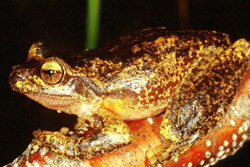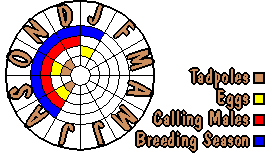Litoria littlejohni
Littlejohn's Tree Frog
Also: Heath Frog, Orange-bellied Tree Frog

+ 59 kb Littlejohn's Tree Frog (Litoria littlejohni)
Restricted in Victoria to the cooler areas of East Gippsland with its distribution stretching to near Wyong in New South Wales, this frog is mainly an inhabitant of forest gullies.
Distribution and habitat

Adults are usually found in vegetation in deeply forested stream gullies in wet and dry forest, woodlands, and shrublands. Eggs and tadpoles can be found in still water in dams, ditches, isolated pools and flooded hollows.
There is a detailed distribution map available for: Victoria.
Calling
Males call from on the ground, at pond edges or in low vegetation. The call is a series of low pitched short clearly pulsed notes - "creeeeep creeeeep creeeeeeep" - lasting several seconds with each note usually longer than the preceding one.
Copyright Murray Littlejohn. Recorded by Murray Littlejohn. Must not be reproduced without permission.
Life cycle

Distinguishing characteristics
Adult
length: 30-60mm.
The eggs are pigmented in small jelly clumps attached to vegetation. Tadpoles are dark brown or olive with grey fins. Adults are large, light brown, or fawn grey, with large toe pads and a distinct skin fold (supratympanic fold) above the tympanum (ear).
Similar species (note: this version was written for Victorian species).
Distinguished from Litoria ewingi and Litoria paraewingi by its distinct supratympanic fold. Distinguished from Litoria verreauxi and Litoria lesueuri by having pads broadly wider than digits. Distinguished from all the above by smelling like curry and generally by its larger size. Previously was considered to be the same frog as Litoria jervisiensis, it was considered as a separate species in 1994.
The scientific names of Litoria littlejohni
Previously included within Litoria jervisiensis.
- Litoria littlejohni (White, Whitford & Mahony 1994)

